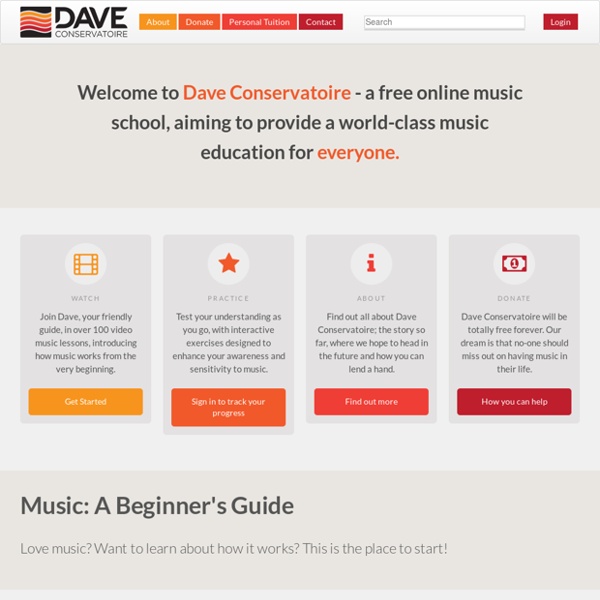



Play Bass Now with MarloweDK - free bass lessons, funk bass exercises, bass guitar lessons, bass tutorials, electric bass lessons, learn to play funk Thou shalt not commit logical fallacies Exploring the World of Music 1. Sound, Music, and the Environment What do different cultures mean by music? This program explores the definition of music from the sine wave to poetic metaphor, and the impact of the cultural environment on musics as different as Bosnian ganga and becarac singing; Tuvan throat singing; Irish, West African, Trinidadian, and Japanese musics; and Western chamber music, jazz, and rock. 2. 3. 4. 5. 6. 7. 8. 9. 10. 11. 12.
Jazz Chords Question : musictheory Classical Music Education: Introduction to Classical Music Classical music is probably more familiar than we might at first imagine. Indeed, nowadays it is all around us, whether it be in restaurants, supermarkets, lifts, for advertising or as theme and incidental music on television. A great deal of film music either directly uses or draws from the 'classical' tradition; a good example of the former might be '2001: Space Odyssey', and of the latter, the many scores John Williams has composed in recent years for such blockbusters as the Star Wars and Indiana Jones trilogies. In the vast and wide-ranging world of 'classical' music there is truly something there for everyone - pieces which once discovered represent the start of an exciting and irresistible journey which will provide a lifetime's listening pleasure. Any attempt to define what is meant literally by the term 'classical' music is fraught with difficulty. In general 'popular' music may be as clear in expression as the longer examples of 'classical' music.
A Master Class in Jazz Performance and Creativity with Pianist Kenny Werner Listening to Music About the Course This course fosters the development of aural skills that lead to an understanding of Western music. The musical novice is introduced to the ways in which music is put together and is taught how to listen to a wide variety of musical styles, from Bach and Mozart, to Gregorian chant, to the blues. View class sessions » Course Structure This Yale College course, taught on campus twice per week for 50 minutes, was recorded for Open Yale Courses in Fall 2008. Professor Craig Wright has created a new online course for the Coursera platform. Course Materials Download all course pages [zip - 10MB] About Professor Craig Wright Craig Wright received the degree Bachelor of Music in piano and music history at the Eastman School of Music (1966) and a Ph.D. in musicology at Harvard (1972), and since 1973 has taught at Yale University where he is currently the Henry L. and Lucy G. Syllabus Professor Craig Wright, Henry L. and Lucy G. Description Texts Wright, Craig. Requirements Grading Sessions
Pop chord progressions in roman numeral notation : musictheory Introduction to Music Theory Course Description Music theory, one of our top online music classes, is the analysation of how music works - by studying the notation and language of music. Unlike other online music lessons, Introduction to Music Theory introduces the basic concepts and terms needed to discuss melody and harmony. Concepts covered include interval, major and minor keys and scales, triads, chords and beginning harmonic analysis.The course is suitable for teens or adults with no background in music theory but some familiarity with reading common notation and playing an instrument (or singing). To qualify for your official ALISON Diploma, Certificate or PDF you must study and complete all modules and score 80% or more in each of the course assessments. Upon completion of this course you will understand where octaves come from; you will know how to name a particular octave and how to divide octaves into a scale. Manage a Group of Learners
What are the "rules" for creating extended chords? : musictheory